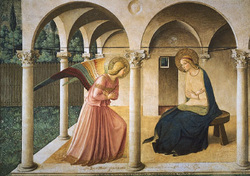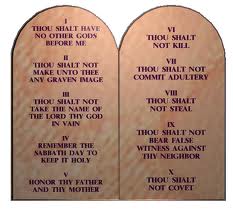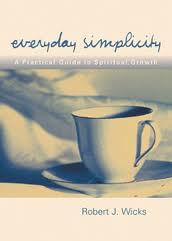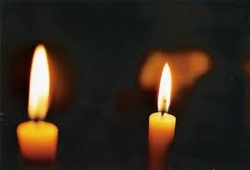|
My sisters and I are visiting Mom today. There is no picture bright enough to show the light that shines from my mother. This morning I offer prayers of thanksgiving for this woman who will be 101 years old in May.
0 Comments
 Here’s my dilemma of the moment, or at least one I’m grappling with during these last days at the cottage. Most everything I read tells me that there is a direct corollary between self-love and one’s love for others; the more you love yourself, the more you will love others; love your neighbor as yourself. Fine; I get that. But then I read about humility; walk humbly with God, don’t exalt yourself; compassion is gained through weakness. Fine; I get that, too, at least in theory. The challenge is to integrate the two and live them out. Being a fortunate and confident person, I don’t have a very good handle on humility. I grapple with vainglory—I am a child of God, and God has especially chosen ME. That pops up as a little sin of mine. I don’t think the answer is to beat myself up, but I find that praying for myself is humbling and brings a necessary balance to my call to pray for others. We’re all in this together. I have a lot of stuff to work on. Whatever good that befalls me is grace. Thanks be to God.  From a monk's cell, Fiesoli, Italy I have four full days remaining at the cottage. Days when I can get up early and sip coffee as I watch morning come; days with all the time in the world to live into my routine of prayer, reading, napping, meditating, walking. There is a long history of monastic tradition of prayer, study and work that contemporary writers have explained for those of us drawn to some kind of prayer routine. Joan Chittister, Esther de Wall, Noreen Vest and Kathleen Norris suggest ways for us to apply the Rule of St. Benedict to our own lives. I find that keeping a prayer practice gives me enormous comfort, comfort that I lose when I allow my basic prayer routine to wander. When I feel restless and out of sorts, I realize that I have forgotten to keep sight of the spiritual buoys that keep God’s presence in sight. If I want to live a life for God, Benedict points me in the right direction, helping me remain intentional about the stability, obedience, and humility. A prayer routine is my best way of staying aware of the presence of God in all things.  Do you ever read something that just clicks with you and off you go, singing away? All at once you’ve got the tune. I’ve been feeling that way every since Robert J. Wicks gave me permission to talk with God. Actually, I’ve been walking and talking with God for years, so it was not so much permission as an affirmation that I’m on the right path, in the right recording studio. At the cottage I talk with God as I sit in the morning twilight and anticipate the sunrise. But for years I’ve been mainly talking with God while walking. When I invite God into the conversation we seem to enter an honest dialogue, and I begin to sense that truths that I can’t avoid. These talks with God are conversations, although I must admit that God is a mighty good listening. If anything, God is closer to being a mediator, certainly not a giver of laws. When I was a child I learned about the Ten Commandments in Sunday school. Now, as a adult, I’m talking with God about what they mean for me.  Yes, this morning I rejoice! At 5:30 I was greeted by Venus, moonshine on the water and a dusting of snow on the ground. There wasn’t a cloud to block the sun’s on-time arrival at 6:36. All this made it easy for me to talk with God this morning, and to offer prayers of praise and thanksgiving. I have a prayer friend who often reminds me to do just that after praying for days for a difficult situation. It is a challenge for me to remember. I always seem to be onto my next request. Another spiritual challenges is to feel as connected to God on gorgeous days such as today, when the weather isn’t nasty. This is your new blog post. Click here and start typing, or drag in elements from the top bar.
 Has a book ever found its way into your hands at just the right moment in your life? Well, it has happened to me. Last week I discovered “Everyday Simplicity”, a gem of a book, in my bookshelf and decided to bring in to the cottage. Previous underlinings suggest that I had already read the book, right now I feel like I am reading it for the first time. As the cover tell us, author Robert J. Wicks offers “common sense advice on how to get a spiritual life—no matter how busy your day.” Isn’t that what why I have been coming to the cottage? To get a life. What kind of life? A spiritual life, of course. How could I have been so blind? I’ve known that I’ve come here searching for God, looking for the Holy, desiring to go deep into my Soul (hard to put into words) and feeling called to pray for people. But Wicks is helping me connect these spiritual longings to my everyday life. So obvious, and on some level, something I’ve known. I must say it’s very satisfying to have someone name what I have been struggling to figure out, and to give me some simple, everyday tools. Perhaps “Everyday Simplicity” will help you on your faith journey, will help you integrate your faith with your everyday life. I have offered a brief outline of the book, as well as a few quotes from it, in the section entitled Spiritual Books.  I want to finish sharing my thoughts about the Iona Prayer Circle list (see recent posts). The brief explanation after each name describes many issues that people are dealing with out in the world: cancer and other illnesses, young mothers with cancer, young adults with cancer, single mothers, job conflicts, loss of a child, alcoholics, depression among the young and old, loneliness, drug addiction, mental illness, estrangement between a parent and child. You can add your own. So, when I pray the list, I pray for the individuals, and then for others I know (and don’t know) with similar concerns.  How do I pray for a 100 year-old woman whose external light is growing dim? This women, my mother, was born with a joyful disposition and has always exhibited a deep inner peace, accompanied by a strong spiritual practice. A year ago she told me that her favorite book was the Bible: “I know it well.” My mom doesn’t need any intercessory prayers from me, although pray I will. Her internal light is still glowing, and I know that God does not disappoint.  Clouds over Iona, May 2010 Here’s how I pray for the people on my Iona Prayer Circle section list. I tell you this because I find it helpful to hear how others pray; I figure it might be the same for you. Prayer is so mysterious and really impossible to put into words, but it helps to stumble along with others. My current list has 23 names, each followed by a few lines of explanation. I close my eyes, and say each name as I visually, as in a cloud, wrap the person in God’s love. I remain with that image, doing my best to keep my mind empty, clear of personal chatter. That is the challenge: to keep the prayer about the person and God, not about me. Then I pray for all those whom I know, and don’t know, who are experiencing similar difficulties. I’ll write about that in my next blog.  In yesterday’s post I provided a little background on the Iona Prayer Circle that I participate in. As I explained, when we sign on we agree to pray for the people on our list at least once a week. That, however, didn’t work for me. I’d either forget or my prayers felt unintentional, too rote. But more importantly, they felt disingenuous. I had made the commitment to pray and these folks were counting it, as was apparent from the comments I received: “She continues to value your prayers,” and “She feels to be moving on and thanks everyone who has been praying for her.” This experience is teaching me that agreeing to pray for someone is serious business for both the giver and the receiver. But t is more than just about the person praying and the person prayed for; it is about the “person” being prayed to, God. For me, prayer is my most powerful spiritual teacher. It holds faith and good works in the same vessel. |
Contact me
bobbifisher.mac@mac.com Archives
August 2023
Categories
All
|
|
|
 RSS Feed
RSS Feed